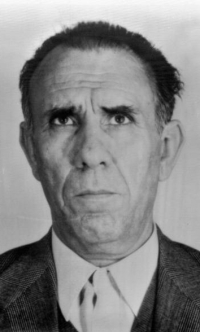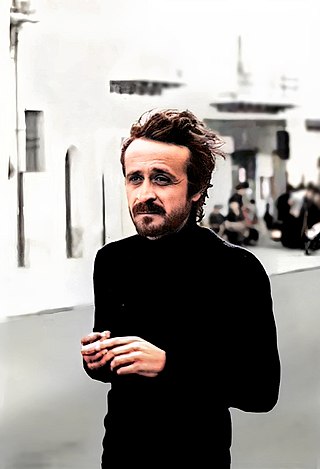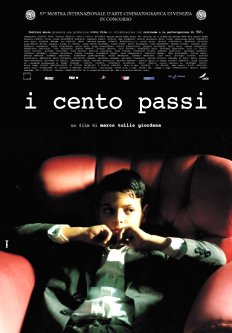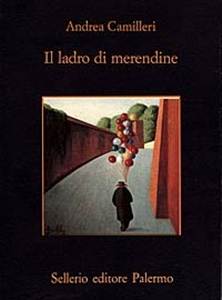
The Seven Sleepers, also known in Christendom as Seven Sleepers of Ephesus, and in Islam as Aṣḥāb al-Kahf, is a late antique Christian legend, and a Qur’anic Islamic story. The Christian legend speaks about a group of youths who hid inside a cave outside the city of Ephesus around AD 250 to escape Roman persecutions of Christians and emerged many years later. The Qur'anic version of the story appears in Sura 18 (18:9–26).

Gaetano Badalamenti was a powerful member of the Sicilian Mafia. Don Tano Badalamenti was the capofamiglia of his hometown Cinisi, Sicily, and headed the Sicilian Mafia Commission in the 1970s. In 1987, he was sentenced in the United States to 45 years in federal prison for being one of the leaders in the "Pizza Connection", a $1.65 billion drug-trafficking ring that used pizzerias as fronts to distribute heroin from 1975 to 1984. He was also sentenced in Italy to life imprisonment in 2002 for the 1978 murder of Peppino Impastato.

La Piovra is an Italian television drama series about the Mafia. The series was directed by various directors who each worked on different seasons, including Damiano Damiani, Florestano Vancini, Luigi Perelli, and Giacomo Battiato . The music was written by Riz Ortolani, Ennio Morricone, and by Paolo Buonvino.

Salvatore Inzerillo was an Italian member of the Sicilian Mafia, also known as Totuccio. He rose to be a powerful boss of Palermo's Passo di Rigano family. A prolific heroin trafficker, he was killed in May 1981 by a firing squad of the Corleonesi family led by Totò Riina during the Second Mafia War who opposed the established Palermo Mafia families of which Inzerillo was one of the main proponents.

Michele Greco was a member of the Sicilian Mafia and a convicted murderer. Greco died in prison while serving multiple life sentences. His nickname was Il Papa due to his ability to mediate between different Mafia families. Greco was the head of the Sicilian Mafia Commission.

InspectorSalvo Montalbano is a fictional police chief who is a brilliant detective created by Italian writer Andrea Camilleri in a series of novels and short stories. The books were written in a mixture of Italian, strict Sicilian, and Sicilian Italian.

Giuseppe "Peppino" Impastato, was an Italian political activist who opposed the Mafia, which ordered his murder in 1978.
The Second Mafia War was a period of conflict involving the Sicilian Mafia, mostly taking place from 1981 to 1984 and involved thousands of homicides. Sometimes referred to as The Great Mafia War or the Mattanza, it involved the entire Mafia and radically altered the power balance within the organization. In addition to the violence within the Mafia itself, there was violence against the state, including a campaign of deliberate assassinations of judges, prosecutors, detectives, politicians, activists and other ideological enemies. In turn, the war resulted in a major crackdown against the Mafia, helped by the pentiti, Mafiosi who collaborated with the authorities after losing so many friends and relatives to the fighting. In effect, the conflict helped end the secrecy of the Mafia.

I cento passi is an Italian biographical crime drama film released in 2000, directed by Marco Tullio Giordana about the life of Peppino Impastato, a left-wing political activist who opposed the Mafia in Sicily. The story takes place in the small town of Cinisi in the province of Palermo, the home town of the Impastato family. One hundred steps was the number of steps it took to get from the Impastato house to the house of the Mafia boss Tano Badalamenti. The film has been released on Regions 2 and 4 DVDs but a Region 1 release has yet to be made. Although selected as the Italian entry for the Best Foreign Language Film at the 73rd Academy Awards, it was not nominated.

The Greco Mafia family is historically one of the most influential Mafia clans in Sicily, from the late 19th century. The extended family ruled both in Ciaculli and Croceverde Giardini, two south-eastern outskirts of Palermo in the citrus growing area. Members of the family were important figures in the Sicilian Cosa Nostra. Salvatore "Ciaschiteddu" Greco was the first ‘secretary’ of the Sicilian Mafia Commission, while Michele Greco, also known as The Pope, was one of his successors.

The Snack Thief is a 1996 novel by Andrea Camilleri, translated into English in 2003 by Stephen Sartarelli.

Chronicle of Poor Lovers is a 1954 Italian drama film directed by Carlo Lizzani. It competed for the Grand Prix at the 1954 Cannes Film Festival.

Luca Zingaretti is an Italian actor and film director, known for playing Salvo Montalbano in the Inspector Montalbano mystery series based on the character and novels created by Andrea Camilleri. Zingaretti is a native of Rome, and the older brother of politician Nicola Zingaretti.

The Monster of Florence is the name commonly used by the Italian media for a non-definitively identified serial killer active within the Metropolitan City of Florence between 1968 and 1985. The Monster murdered 16 victims, usually young couples secluded in search of intimacy, in wooded areas during new moons. Several connected persons have been convicted for involvement in the murders, yet the exact sequence of events, the identity of the main actor and the motives remain unclear.

Salvatore Riina, called Totò, was an Italian mobster and chief of the Sicilian Mafia, known for a ruthless murder campaign that reached a peak in the early 1990s with the assassinations of Antimafia Commission prosecutors Giovanni Falcone and Paolo Borsellino, resulting in widespread public outcry and a major crackdown by the authorities. He was also known by the nicknames la belva and il capo dei capi.

Rai Fiction is an Italian production company founded in 1997. Owned and operated by Radiotelevisione Italiana (RAI), the national broadcasting company of Italy, the company produces content for Rai's channels, producing animations, sitcoms, and other programmes. Rai Fiction also works in association with foreign production studios and TV channels as well as other production companies in Italy.

The Potter's Field is a 2008 novel by Andrea Camilleri, translated into English in 2011 by Stephen Sartarelli. It is the thirteenth novel in the internationally popular Inspector Montalbano series.

The Inspector Montalbano television series are Italian police procedural stories. Based on Andrea Camilleri's detective novels, they are located in the imaginary town of Vigàta, Sicily, which is based on Camilleri's native Porto Empedocle. The series protagonist, Salvo Montalbano, is the police chief, or commissario.

The Age of Doubt is a 2008 novel by Andrea Camilleri, translated into English in 2012 by Stephen Sartarelli. It is the fourteenth novel in the internationally popular Inspector Montalbano series.

The Young Montalbano is an Italian television spin-off produced and broadcast by Radiotelevisione Italiana (RAI) in 2012 and 2015. It is a prequel to the Inspector Montalbano series that are based on the detective novels of Andrea Camilleri. The setting is the fictional town of Vigàta, Sicily.



















